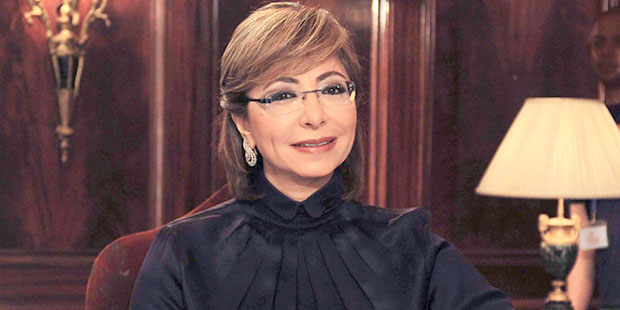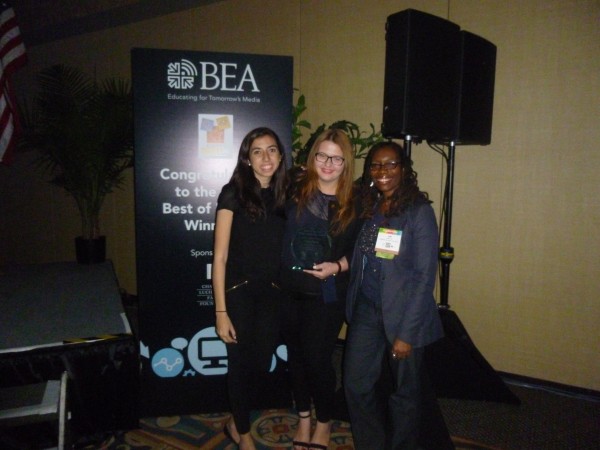El Hadidi Reflects on The Caravan 30 Years Later 

@ENGYALY7
She has been chosen twice as the best TV anchor in Egypt by two mass polls conducted by the Al Ahram Newspaper (2010) and Al Masry Al Youm (Independent Daily) (2010).
El Hadidi has also been listed on the 100 most powerful Arab women in 2015, coming out at number 34.
As one of the most powerful Arab women in the world, she is known to have influential viewpoints that translate to the masses to a large degree.
El Hadidi who is currently presenting a nightly news show, Hona Al Assema [This is the Capital] for CBC, is an AUC alumna and former editor- in-chief of The Caravan.
The Caravan talked to El Hadidi to learn more about her path to success in the turbulent media field in Egypt, and her views on its current state.
What made you want to be editor-in-chief of The Caravan?
When I joined AUC in 1983, I started enrolling in journalism classes to see what it would be like, and The Caravan was my first journalistic experience.
I went in as a reporter and then I became an editor by choice due to the quality of my writing.
What were the steps you took right after you graduated that contributed to where you are today?
There were so many steps I took. It was a very long and difficult journey, not easy at all. I started working as a desk producer at NBC [a US network] in Cairo. I answered phone calls, arranged news, and arranged schedules for shows; that was in 1987.
Then I moved on to The New York Times – for three years I was a stringer, I started writing my own articles that had my bylines. During that time, I started writing in Arabic in Sabah El Kheir Ya Misr. I was supported by Mr. Mofeed Fawzi and others.
So they really motivated me at that time and I had my bylines in both Arabic and English.
And then I established, along with Emad El-Din Adeeb, Al Alam El Youm newspaper, which was the first daily business newspaper in the Arab world. During that time, I was also doing my masters in broadcast journalism in AUC at the Adham Center.
This helped me go into television after that. I started with MBC in Dubai and moved there with my husband.
I specialized in business journalism. I then moved to Al-Arabiya and Al- Jazeera and then finally I switched to Egyptian television with my first program, Etkalem, in 2005.
And I moved on from that time to be what I am now on CBC.
Have you ever felt personally threatened while doing your job as a journalist, because of the difficulties of the job?
Of course. During the time of the Muslim Brotherhood, and still, we receive many threats up until this moment. I used to heavily criticize the Muslim Brotherhood, and attack every single action they took. We received many threats, not only light threats, but also murder threats.
How did you cope with that?
I had courage, I knew what I was doing was right. I believed in what I was doing, and I believed that my country needed to be saved from whatever could be saved of the Egyptian identity. So I felt like I really needed to do that and not let their meaningless threats get in my way.
Is there a big difference between the media industry when you were a student and the field when you started working?
Of course, there is a huge difference.
When you are a student, you are very happy and satisfied with an article you write, and especially when other students read it.
Actually, we became different students as soon as we started gaining political awareness.
At that time, we had multiple problems the Student Union and most of the students disagreed with the university’s constitution.
So we used to write articles about the problems we had with the administration, and we went through a lot of arguments, thus producing articles that criticized the administration of that time.
This developed my journalistic skills because we started learning how to write different opinions. It was heaven for me as a student, but the real world is so much different than it was in university.
What is something that you wished you could have learned at AUC that you learned the hard way in the real world?
I don’t know. Life taught me how to deal with very difficult situations.
In university, they would never teach you how to deal with a situation when you are threatened, or when somebody tells you he will kill you or attack your kids.
This is something that nobody can teach. Sadly, I learned it the hard way in the real world.
Do you think journalism is increasingly becoming a woman’s job in Egypt?
I think a lot of women like to be on TV.
They all want to come out of university and become anchors. This saddens me. I became an anchor after such a long time of studying.
Not only masters, but I also took courses in Reuters, as well as a course in Tufts University in Boston.
I studied my whole life to come out on screen and deliver information to people.
But to come out of university and just have a pretty face on TV will definitely not make you a good anchor.
What do you think of Egypt winning a seat at the UN Security Council?
I am very happy of course. But this is something that we all expected a long time ago. This is finally Egypt’s turn; there are turns for the countries and turns for the continents.
So, I’m very happy, I hope Egypt manages to play a good role in discussing major issues, especially the Palestinian dilemma.
What about the parliamentary elections, do you think the youth are going to vote?
This is the first day, so I’m not sure what will happen.
I hope they go. I can see that a lot of them have objections, and I understand why they might have objections.
But I hope they learn that politics is all about participation. Even if they don’t like the whole process, they have to seize whatever is available at the moment in order to try to change and push for their role and whatever they believe in.
How do you juggle being a mom and having such a high profile media personality?
That’s the most difficult thing, especially when my son was very young. But now it’s much easier. I have to make a lot of effort and organize my time.
I have to have equal time for work and my son. The thing is my job is very difficult because something always comes up and there are emergencies all the time. But I think I’ve managed.
What do you think about the future of the Egyptian media landscape?
I think it’s going to change a lot. It is not settled now as Egypt is shaken economically and politically, so it will definitely change, and I cannot wait until it does.


